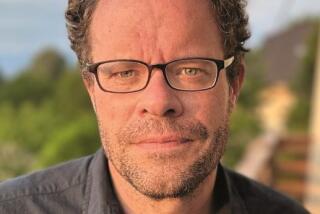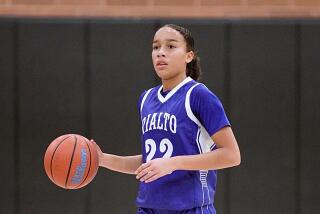Raheem Finds Signpost at Cleveland : Deaf Basketball Player Fits In After Awkward Experience at Fairfax
- Share via
RESEDA — Coaches and players share a special bond, but few have the closeness enjoyed by Cleveland High basketball player Rasool Raheem and Coach Kevin Crider.
Dealing with deafness has united them. Because of spinal meningitis contracted at age 2, Raheem lost the hearing in his left ear and partial hearing in the right, a condition that has improved little in the intervening years.
Crider has an older brother, Sam, who is deaf, and the coach remembers the sign language he learned as a child.
“Having Coach Crider here really helps me a lot,” said Raheem, a 6-foot-2 senior forward. “He makes me feel comfortable and looks out for me.”
Crider admits that having Raheem on the team has stirred dormant emotions and forced him to change some of his coaching strategies, but he insists he makes the trade-off gladly.
“When I found out about Rasool, it brought back a flood of memories from my childhood,” Crider said. “My brother lives in Louisiana and I haven’t seen him in five years so I haven’t used my signing much, but with time you start to get the hang of it.
“I wish that I could have had Rasool here all four years.”
Raheem is the youngest of six children and the only one with hearing loss. A native of Los Angeles, he lived briefly in Mississippi, attending a school that specialized in assisting deaf students.
Sports have played an important role in Raheem’s life. As a sophomore in Mississippi he played wide receiver and quarterback on an eight-man football team.
However, his stay in Mississippi proved short. Raheem moved back to Los Angeles for his junior year and enrolled at Fairfax High. He played basketball and volleyball and ran track.
But Raheem was disappointed with his experience on the basketball team, saying Fairfax Coach Harvey Kitani dealt awkwardly with his hearing loss.
Kitani, who has coached at Fairfax for 13 seasons, said Raheem might have misunderstood his intentions.
“Sometimes we were not happy with his intensity,” Kitani said. “He felt he was being punished by having to run our drills and that was not the case. The thing is, when he makes up his mind to take it to the basket strong, he is an excellent inside player.”
Said Raheem: “There were times he would yell at me to do things and I didn’t know. Here at Cleveland, they do things a little differently.”
Mere coincidence brought Raheem to Cleveland. His family moved to the San Fernando Valley during his junior year. He enrolled at the Reseda school and came under the tutelage of Crider.
His brother’s deafness actually separated the Criders when they were children in West Virginia. In part because Sam was deaf, Kevin was still unable to speak at age 4 despite no physical explanations for the problem. Sparked by his family’s fears and at the suggestion of doctors, Crider and Sam, 9 at the time, were separated.
Sam was sent to Los Angeles for speech therapy and Kevin went to Cleveland, Ohio, Three years passed before the brothers were reunited in Los Angeles. By then, Kevin Crider talked normally and had learned sign language to communicate with his brother.
*
Although Crider and Raheem bonded quickly this season, Raheem struggled to adjust to a new team.
Teammates were unaware of his hearing impairment when they first met him. Junior Brignac, a three-sport athlete, didn’t learn of Raheem’s disability until after several practices.
“Because I play football, I didn’t report to basketball until after the team had been together for a while,” Brignac said. “I had no idea about his hearing condition until I heard some other guys talking about it.”
Once informed, his teammates came to Raheem’s aid, with Brignac and Donald Hope assisting Raheem with his classwork. In return, Raheem teaches them sign language.
“I have a lot of respect for Rasool and what he has accomplished,” Brignac said. “It’s not an easy situation that he is in.”
Even though it’s his first year at Cleveland, Raheem has made an impact. He has worked his way into the starting lineup and has made himself a leader.
There is one such instance of leadership that Crider proudly points to.
Players and coaches had assembled in a hotel team to discuss strategy for a game in the Berkeley tournament last month, and Crider grew exasperated as he reviewed the game plan.
He wanted to reinforce defensive schemes. He diagramed one scenario. Then he went over another. Still, he drew no reaction from his team.
Finally Raheem stepped up and told his teammates that they were the ones who had a hearing problem, not him.
“It was an emotional moment when he made that statement,” Crider said. “It meant a lot to me and I really think that the kids on our team took notice of what Raheem said.”
Still, communication from coach to player during fast-paced games can be problematic. During free throws and other breaks in the action, Crider either signs Raheem instructions or motions him to the bench for a more-detailed explanation.
“There are times when you could have a megaphone and call out a kid’s name and you’re not going to get his attention because the gyms are so noisy,” Crider said. “In basketball using your hands to instruct is common, so it isn’t as difficult as you’d think to communicate with Rasool.”
When the team switches defenses on the fly, players must tap Raheem to communicate the change, an awkward device that often leaves the team vulnerable to quick scores.
When Cleveland played Loyola last month, the Cubs scored a dozen points off lapses on defensive changes. In a one-point victory over Granada Hills on Wednesday, Crider benched Raheem for the game’s final moments. “The game was really tight and the team couldn’t afford to have a defensive letdown,” Crider said.
Cleveland’s glory days are long gone. A few seasons ago, the Cavaliers routinely challenged for the City Section 4-A Division title. This season, the Cavaliers are 4-13.
Despite the record, Raheem and Crider consider themselves lucky to have experienced this season. Raheem hopes to play college basketball at Gallaudet University in Washington, D.C., a college for deaf students.
“I came to Cleveland to get an education and play basketball,” Raheem said. “Because of Coach Crider I’m getting more then I expected.”
And Crider received something he hadn’t bargained for, either.
“As a whole, Rasool brings character to our team,” Crider said. “He brings something to our team that no one else can and I am thankful for it.”
More to Read
Get our high school sports newsletter
Prep Rally is devoted to the SoCal high school sports experience, bringing you scores, stories and a behind-the-scenes look at what makes prep sports so popular.
You may occasionally receive promotional content from the Los Angeles Times.






